Key takeaways:
- The death penalty raises moral questions about justice and redemption, as many inmates reflect on their complicated lives and the possibility of transformation.
- Personal stories from death row reveal the deep emotional impacts of capital punishment, emphasizing the need for empathy and understanding towards those affected.
- Advocacy against the death penalty highlights systemic inequalities and the irreversibility of wrongful executions, calling for a focus on healing instead of revenge.
- Sharing individual narratives fosters compassion, challenging societal attitudes towards crime and punishment and promoting a more humane approach to justice.
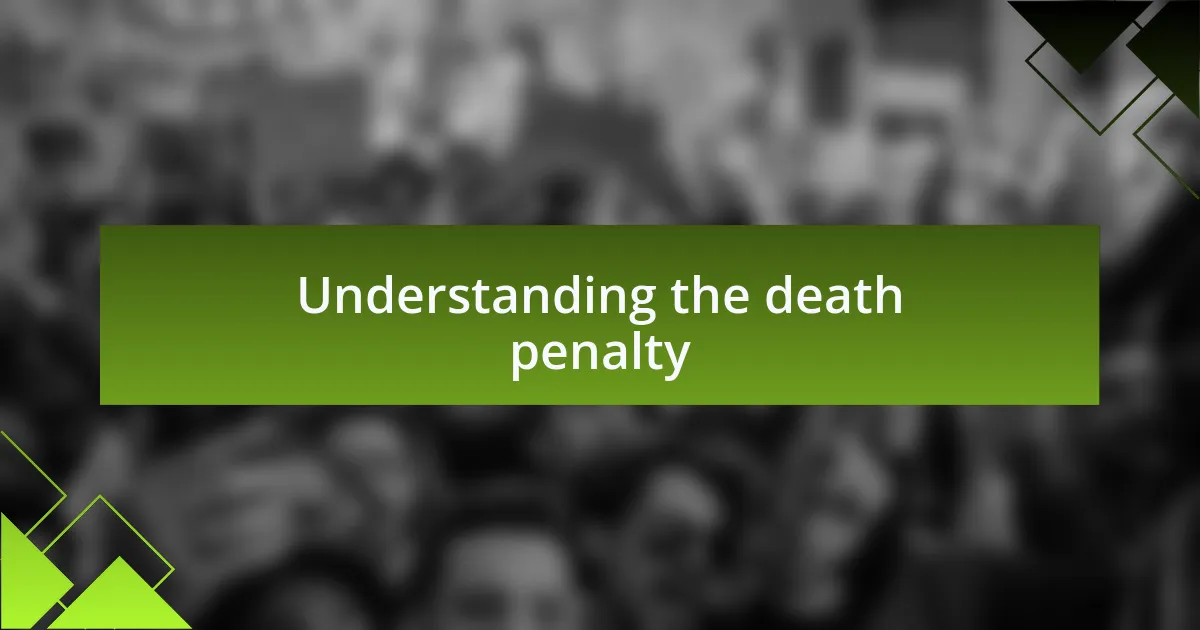
Understanding the death penalty
The death penalty, often referred to as capital punishment, serves as the ultimate penalty for severe crimes like murder. Personally, I recall sitting in a small room, speaking with an inmate awaiting execution. The weight of his words—filled with fear and a surprising sense of hope—left an indelible mark on me. How does society reconcile the morality of taking a life, even when that life is deemed unworthy?
In my discussions with various inmates, I realized that many of them possessed layers of complexity, often shaped by their circumstances. What strikes me most is how their stories challenge the notion that criminals are inherently evil; they emerge as products of their environment and experiences. One individual even articulated his transformation; he spoke of remorse and the desire to help others avoid his fate. Isn’t it essential to consider whether redemption should ever be a possibility?
Understanding the death penalty also means grappling with the its inconsistencies. Some states continue to uphold it while others have abolished it outright. I often wonder how justice can be perceived as fair when it varies from place to place. This disparity raises fundamental questions about equality and the value we place on life itself—issues that are essential for us to confront in this ongoing dialogue.
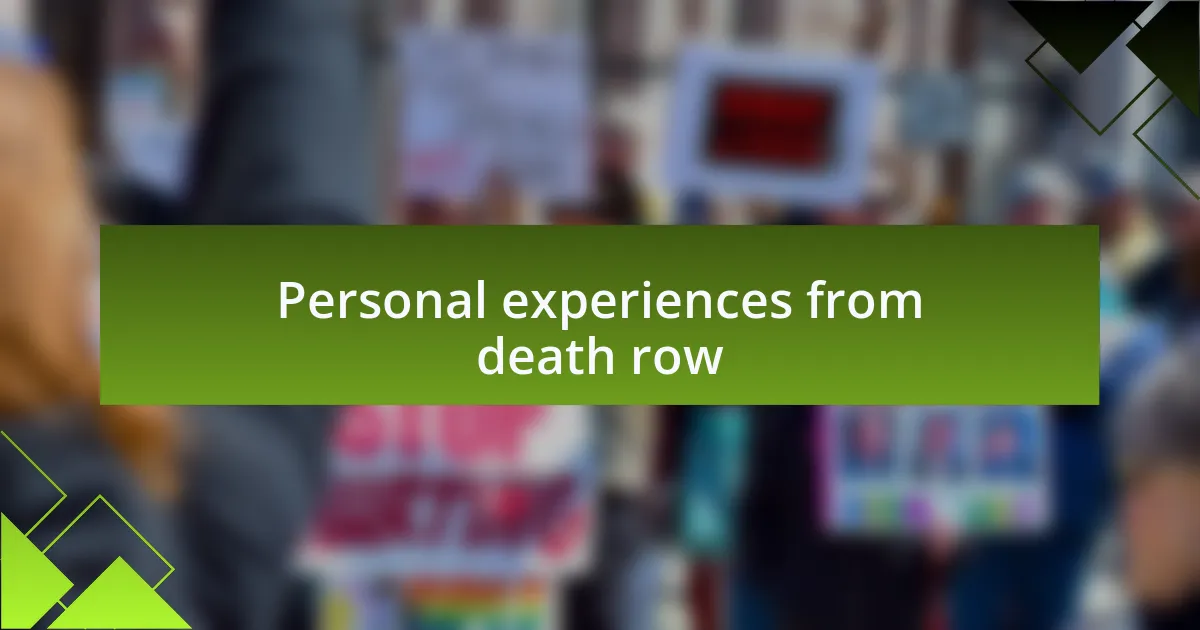
Personal experiences from death row
During my visits, I encountered a man who spoke of his childhood—a life marred by violence and neglect. Listening to him recount those early years, I felt a deep empathy stir within me. It’s hard not to ask, how many of us would act differently under such relentless pressure?
On another occasion, I was struck by an inmate’s laughter—a sound I initially found unsettling in such a grim environment. He shared anecdotes from his life before incarceration, intertwining humor with despair. Here was someone who managed to find light amid such darkness; it reminded me of the resilience of the human spirit even when faced with the bleakest of situations.
Each visit left me with a profound sense of disquiet. I often found myself pondering the significance of forgiveness, not just from society but from oneself. Can true healing occur when a life hangs in the balance? Those moments spent on death row profoundly opened my eyes to the complexities of humanity and the often-overlooked stories behind the sentences.
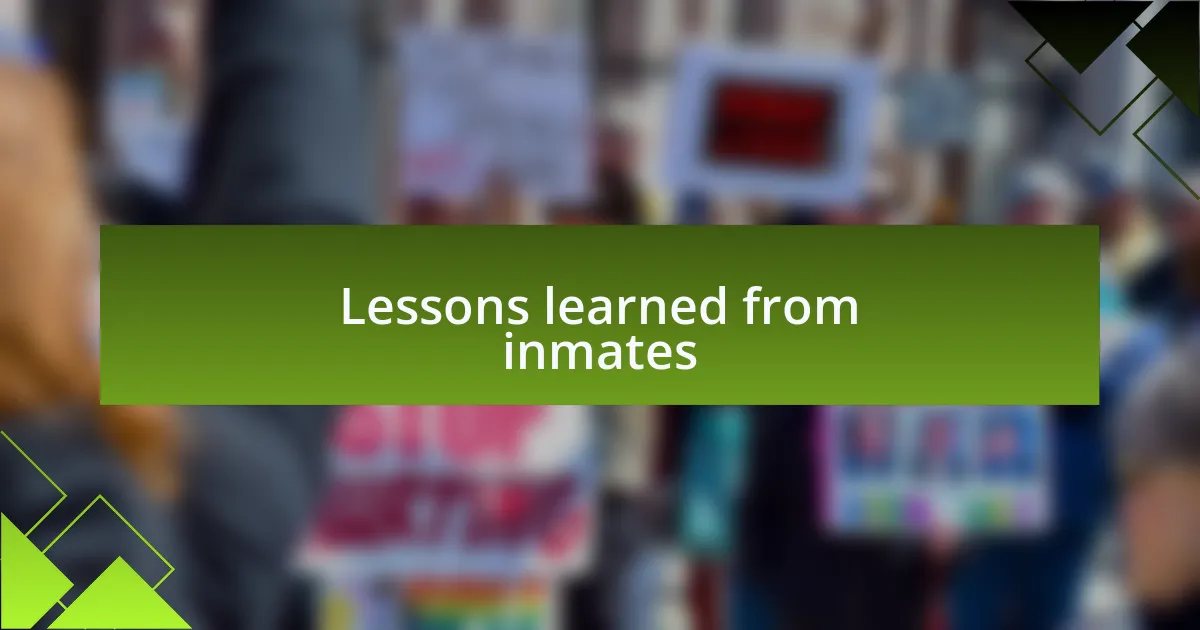
Lessons learned from inmates
In my conversations with inmates, I often heard them express a deep regret for the harm their actions caused others. One inmate shared a story about the day he realized the ripple effects of his choices—how they shattered lives and blurred futures. It made me reflect: when do we take responsibility for our actions, and can we ever truly atone for the past?
During another visit, an inmate revealed how art became his lifeline. Through painting, he channeled his pain and loneliness into something beautiful, bridging a connection to the outside world. It struck me then—how many of us use creative outlets to cope with our struggles? This realization led me to appreciate the therapeutic power of self-expression, even in the darkest of circumstances.
I also encountered a man who, despite facing imminent execution, expressed a desire to educate others about the consequences of crime. He saw his experience as a cautionary tale, willing to share his journey to prevent others from making the same mistakes. It raised an important question: how can we transform our suffering into a lesson for others, and in what ways can these lessons influence societal attitudes towards crime and punishment?
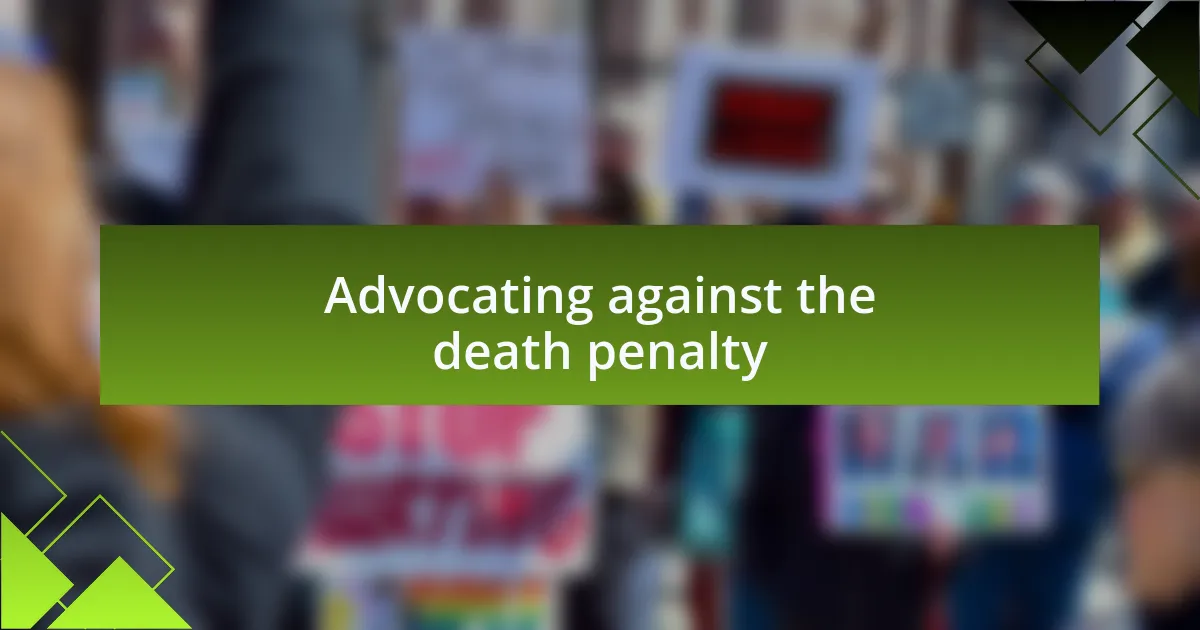
Advocating against the death penalty
Many people don’t realize that the death penalty disproportionately impacts marginalized communities. In my experience advocating for these individuals, I’ve heard heartbreaking stories from families who, rather than receiving justice, faced the added trauma of losing a loved one to state-sanctioned execution. How can we call it justice when some are executed not for their actions but because of systemic inequalities?
One particular case that struck me involved a woman who fought tirelessly to save her brother from execution. Her pain was palpable as she described the lengths she went to prove his innocence, ultimately revealing the flaws in the justice system. I questioned how many innocent lives hang in the balance due to the irreversible nature of the death penalty. This drives home a crucial insight: how can we justify a punishment that offers no chance for redemption or correction?
Moreover, engaging with families who have lost loved ones to violent crimes opened my eyes to another dimension of this issue. Many of them expressed a desire for healing and restorative justice rather than revenge through execution. It begs the question: wouldn’t a focus on healing and prevention create a more compassionate society? Advocating against the death penalty is not just about saving lives; it’s about supporting a more humane approach to justice that emphasizes understanding over punishment.
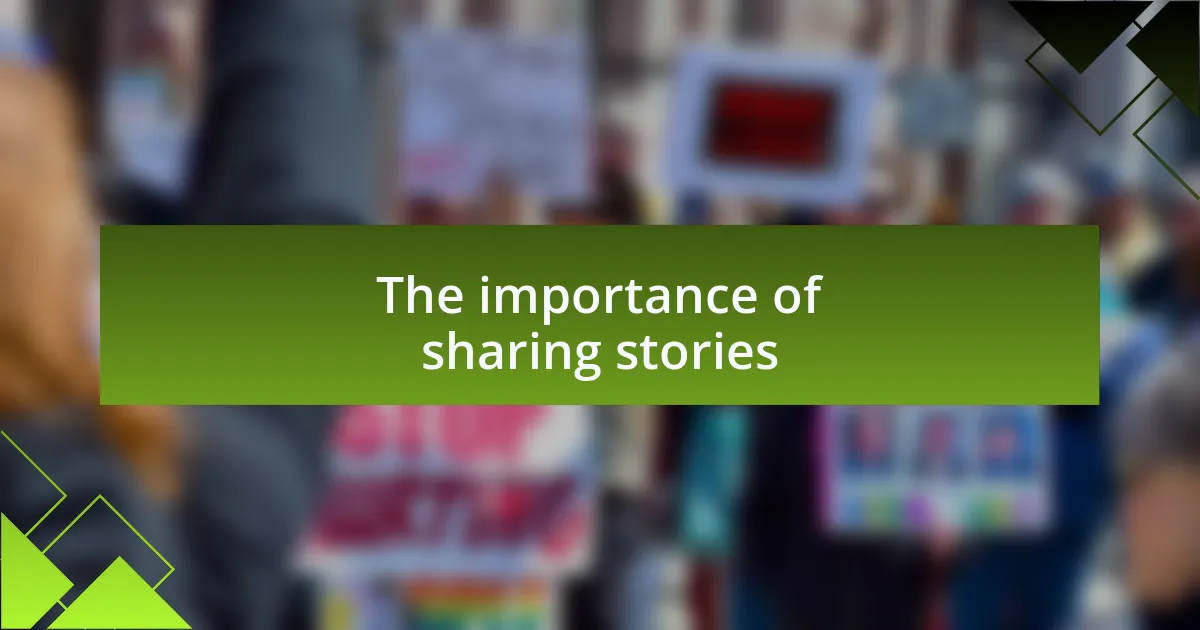
The importance of sharing stories
Sharing stories is essential in our fight against the death penalty because they humanize the individuals affected by this harsh reality. I remember sitting in a small room, listening to a mother recount her son’s last moments before execution. Her voice trembled with sadness, and I felt the weight of her loss resonating within me. How many more voices like hers are silenced, leaving their stories untold?
Every personal narrative adds a layer of understanding to the complex emotions surrounding capital punishment. During one of my visits, I met a man whose reflections on his confinement revealed not just his fears, but also his hopes for a future he might never see. His story wasn’t just about despair; it was a poignant reminder of resilience and the desire for redemption. How can we overlook the very real impact these experiences have on our collective conscience?
Furthermore, sharing these stories creates a bridge of empathy between those who have lived this nightmare and the broader community. I once heard a former prison chaplain speak about the transformative power of listening. He argued that when we share these narratives, we start to cultivate compassion, igniting conversations that challenge the status quo. Isn’t it time we shift the dialogue from punishment to understanding?